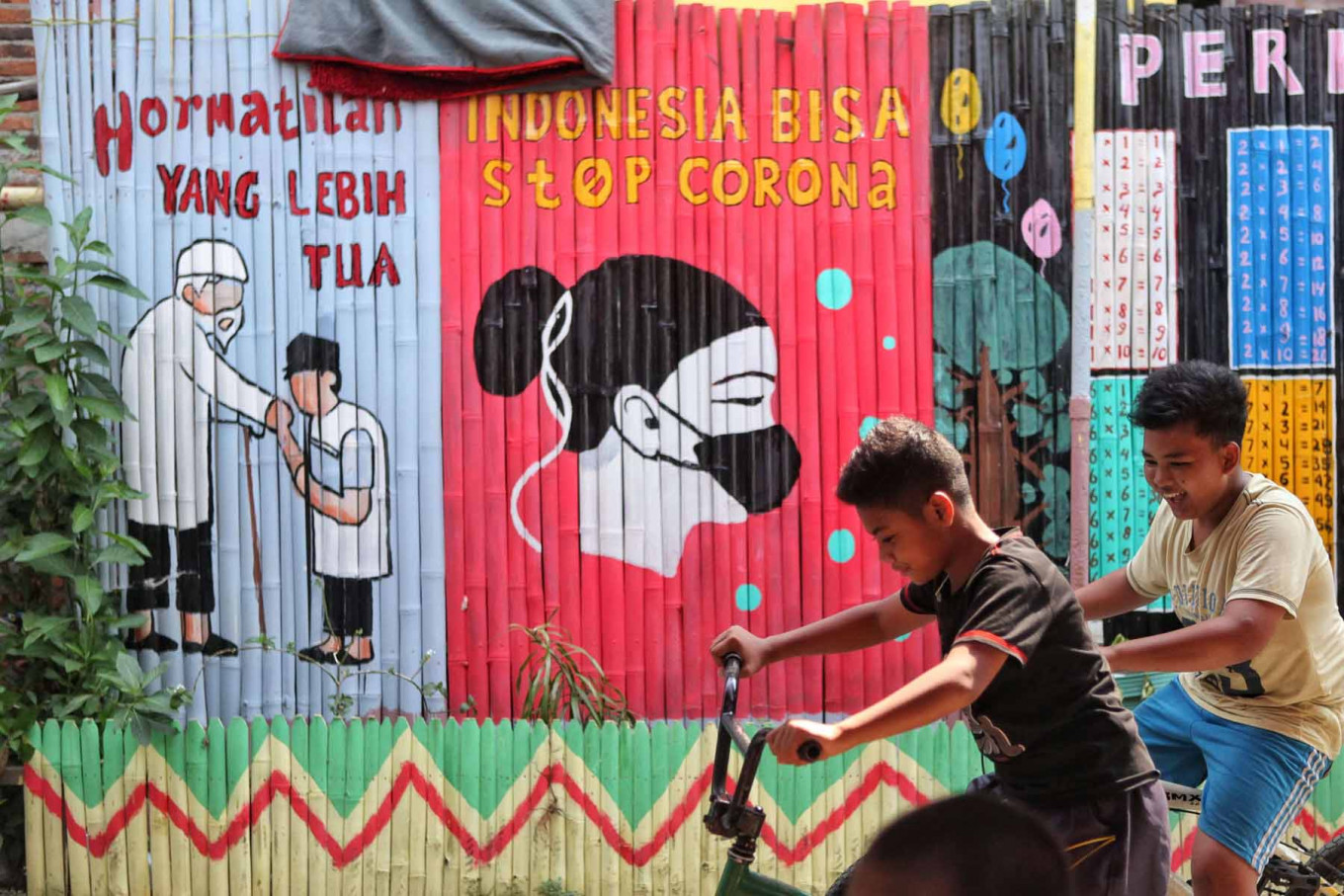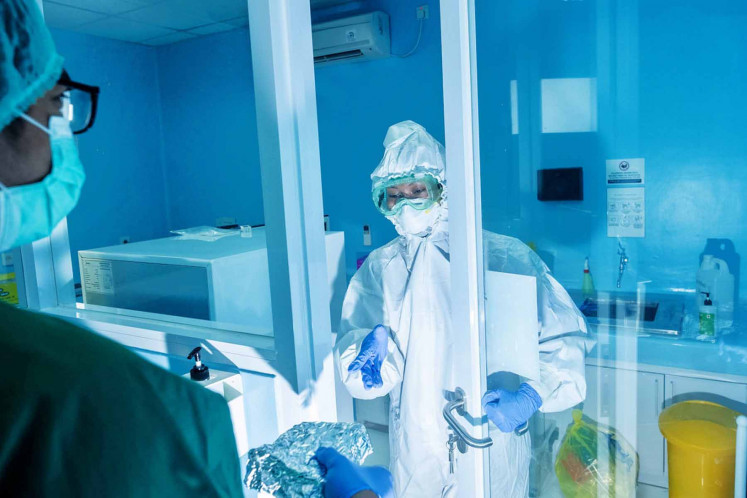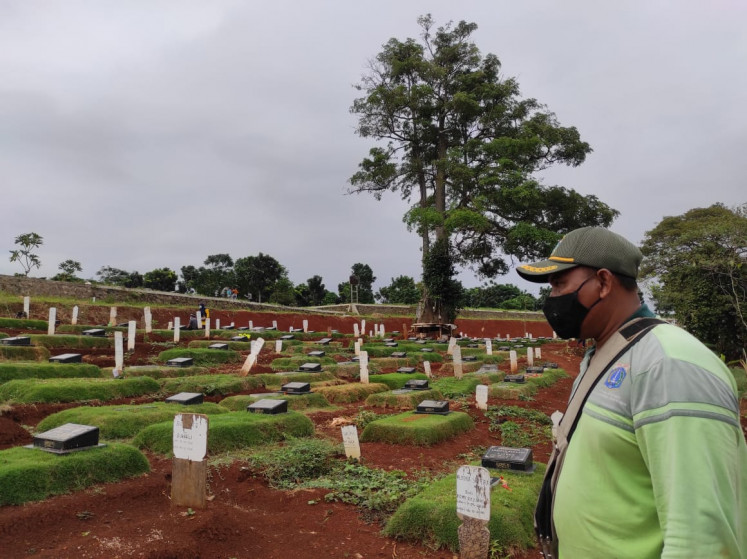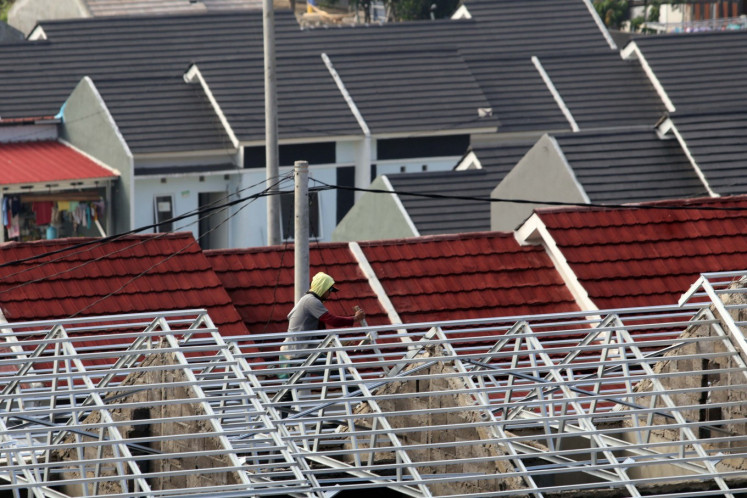Popular Reads
Top Results
Can't find what you're looking for?
View all search resultsPopular Reads
Top Results
Can't find what you're looking for?
View all search resultsUnsung heroes go above, beyond during pandemic
Many have overcome challenges to keep the world spinning, despite their own struggles
Change text size
Gift Premium Articles
to Anyone
A
year to the date after President Joko “Jokowi” Widodo announced Indonesia’s first two confirmed COVID-19 cases, the virus has changed the lives of many in the country.
Millions have contracted the illness, and millions more remain at risk of infection. Hundreds of thousands have lost loved ones, and the global economic downturn has affected both employers and employees.
Still, some people have risen to meet these challenges and keep the world spinning, not only for themselves but also for those around them. Many have gone above and beyond the call of duty to help others in need, despite their own hardships.
Here are a few glimpses into the stories of some of these unsung heroes.
Read also: Without govt support, COVID-19 testing remains low in Indonesia
Aryati, medical specialist
Indonesia’s COVID-19 testing program has encountered many obstacles, including shortages of reagents, testing kits and laboratory equipment.
As the coronavirus spread throughout the country, health authorities began involving more labs, many headed by female specialists.
“It’s hard to just breathe,” said Aryati, reflecting on the past year.
The chairwoman of the Indonesian Association of Clinical Pathology and Laboratory Medicine Specialists (PDS PatKLIn) tested positive for COVID-19 last year and developed “long COVID”. She recovered from the acute illness but was left with prolonged symptoms.
Despite her condition, she says she still tries her best to answer journalists’ questions about her opposition to the government’s requirement that travelers undergo rapid tests.
A laboratory staff member hands out swab specimens that have been mixed with reagents to be analyzed in a real-time polymerase chain reaction (PCR) machine at Warmadewa University in Bali. (JP/Agung Parameswara)Danti, nonpermanent teacher
The COVID-19 crisis has hit the country’s education system hard as the government has imposed its distance learning policy on students, teachers and parents alike. This has been even harder for nonpermanent teachers, who are not civil servants and are often paid much less than permanent teachers.
Danti Prellasita is a 27-year-old nonpermanent teacher at an Islamic elementary school in Jember, East Java. She earns about Rp 700,000 (US$48.80) per month for teaching 26 first graders online each day.
“I feel my workload has increased during the pandemic because the students’ parents will call me at night to ask about subjects or assignments,” says the mother of one.
Despite the challenges of her low wage and the limitations of technology, she says she still loves to teach.
Iin and Annisa, home service providers
Some employees have had the luxury of working from home during the COVID-19 crisis. But not workers like Iin Indriani, a house cleaner.
Iin must still go to her clients’ houses to clean surfaces and rooms, despite the increased risk of contracting COVID-19, especially since the surge in family clusters. She does not have much choice, the 36-year-old says, because her husband has lost his job as a driver.
Before the pandemic, Iin says, she usually had two cleaning jobs per day that paid Rp 100,000 for two hours. Today, she rarely gets three jobs a week, now that more people are staying at home for longer. Others are avoiding hiring external workers or receiving guests for fear that they might bring the virus into their homes.
“My income has dropped drastically,” says Iin, “but I’m grateful as long as my kids can eat.”
Read also: Parents struggling to keep kids focused during online learning
Yuliana and Ramaditya, journalists
The past year has been hard for Jawa Pos TV journalist Yuliana Horiman, who regularly heads out to the field to gather and report news, exposing herself to the risk of contracting COVID-19 from the people she meets.
This is especially so when the 29-year-old is covering news on the coronavirus.
“Despite my best efforts to protect myself, I tested positive for COVID-19 last September,” Yuliana says.
According to the Alliance of Independent Journalists (AJI), at least 300 journalists contracted the disease in 2020.
The disease is a real concern among journalists, including TV journalist Ramaditya Domas. The 27-year-old has been identified as a close contact of at least 20 colleagues who tested positive for COVID-19.
“I realize the high risk of this job during the pandemic, but I don’t want to switch jobs. Being a journalist is my passion and choice,” says Ramaditya.
Adang, a 40-year-old gravedigger at the Pondok Ranggon public cemetery in East Jakarta, is seen working on Friday, the first day of 2021. Since March, Adang has been digging graves for COVID-19 fatalities, as Jakarta’s outbreak has worsened with each passing day. ( JP / Ardila Syakriah)Adang, cemetery worker
Adang has worked at Pondok Ranggon public cemetery in East Jakarta for more than a decade. But the 40-year-old cemetery worker never expected to manage the burials of COVID-19 victims.
Along with around 110 other cemetery workers, Adang has been digging 40 to 45 graves each day to bury the bodies of people who have died of COVID-19. After the cemetery ran out of plots, he and his colleagues were instructed to dig multilevel family graves to bury new COVID-19 victims.
“I hope this pandemic passes quickly and everything returns to normal. We are already digging dozens of graves every day,” he says.
Adang adds that he is afraid he might transmit the virus to his family, although no cemetery worker at Pondok Ranggon has been infected.
As a public employee on minimum wage, he cannot afford to live separately from his wife and son, but he takes whatever precautions he can.












